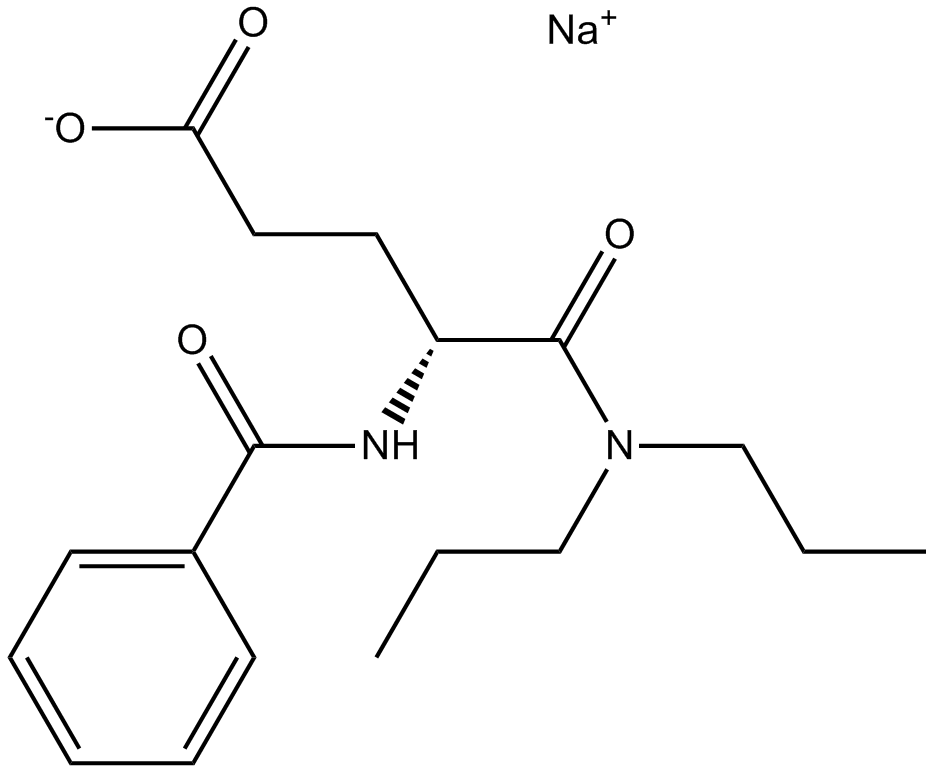Proglumide sodium salt |
| Catalog No.GC11012 |
Proglumide sodium salt is a nonpeptide and orally active cholecystokinin (CCK)-A/B receptors antagonist.
Products are for research use only. Not for human use. We do not sell to patients.

Cas No.: 99247-33-3
Sample solution is provided at 25 µL, 10mM.
Proglumide is a nonpeptide and orally active cholecystokinin (CCK)-A/B receptors antagonist. Proglumide selective blocks CCK’s effects in the central nervous system (CNS). Proglumide has ability to inhibit gastric secretion and to protect the gastroduodenal mucosa. Proglumide also has antiepileptic and antioxidant activities[1][2][3][4][5].
In an in vitro study, Proglumide at concentrations between 0.3-10 mM inhibits CCK-stimulated amylase release dose-dependently, while Proglumide does not influence the basal amylase release at concentrations between 0-3 mM. Dose-response curves to CCK for amylase release shifted to the right with increase in Proglumide concentration. This inhibition by Proglumide is reversible. In addition, the effect of Proglumide is selective for CCK and its related peptide[2].The incubation of HT29 cells with Proglumide significantly reduces the [3H]-thymidine incorporation to HT29 cells in a dose-dependent manner, with an IC50 of 6.5 mM. Proglumide reduces in a dose-dependent manner the percentage of necrosis with a parallel increase of apoptosis up to 70%[3].
Proglumide (250-750 mg/kg; intraperitoneal injection; adult male Sprague Dawley rats) treatment is significantly effective in ameliorating the seizure activities, cognitive dysfunctions, and cerebral oxidative stress[1].
References:
[1]. Ahmad M, et al. The effects of quinacrine, proglumide, and pentoxifylline on seizure activity, cognitive deficit, and oxidative stress in rat lithium-pilocarpine model of status epilepticus. Oxid Med Cell Longev. 2014;2014:630509.
[2]. Iwamoto Y, et al. In vitro and in vivo effect of proglumide on cholecystokinin-stimulated amylase release in mouse pancreatic acini. Gastroenterol Jpn. 1984 Feb;19(1):53-8.
[3]. González-Puga C, et al. Selective CCK-A but not CCK-B receptor antagonists inhibit HT-29 cell proliferation: synergism with pharmacological levels of melatonin. J Pineal Res. 2005 Oct;39(3):243-50.
[4]. Bunney BS, et al. Further studies on the specificity of proglumide as a selective cholecystokinin antagonist in the central nervous system. Ann N Y Acad Sci. 1985;448:345-51.
[5]. Tariq M, et al. Gastric and duodenal antiulcer and cytoprotective effects of proglumide in rats. J Pharmacol Exp Ther. 1987 May;241(2):602-7.
Average Rating: 5 (Based on Reviews and 19 reference(s) in Google Scholar.)
GLPBIO products are for RESEARCH USE ONLY. Please make sure your review or question is research based.
Required fields are marked with *




















